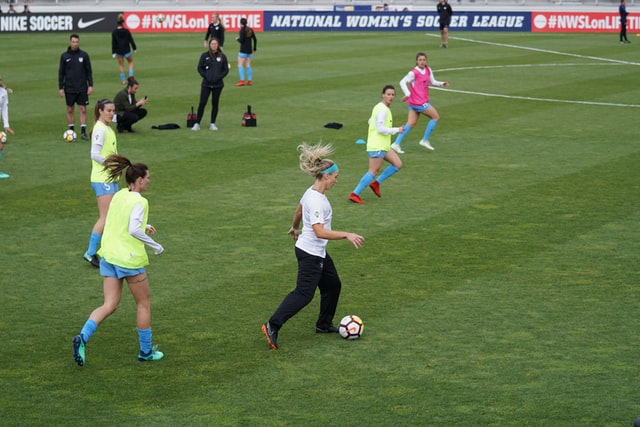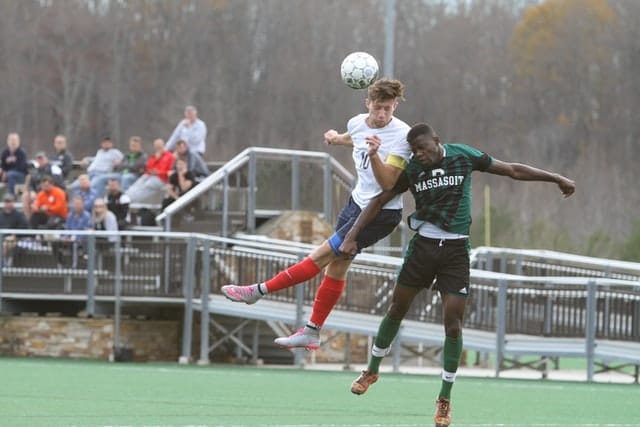When it comes to any sport that requires a lot of contact with other players, the main concern of both the players and their parents will be about how safe the game is.
In case you’re wondering, soccer is not dangerous at all. In fact, most of the game rules exist just to make sure that the game is safe for people to play and enjoy.
However, the rules can’t protect anyone if they are not careful enough during a soccer match. With that said, I have compiled a long list of safety rules and guidelines that every soccer player should abide by no matter what their age is.
Without further ado, let’s get started. Every soccer player should do the following.
1- Make sure that you wear all the necessary protective equipment
This is the most obvious advice I can give you when it comes to playing any sport. Just wear the needed protective equipment and you’ll reduce the risk of injury by a huge factor.
Here are the equipment that you MUST have whenever you play soccer:
Soccer Cleats
Soccer cleats that perfectly fit your feet is a must. When you play soccer, you won’t just be running at a constant speed. Instead, you will be running and suddenly stopping. You will be changing your direction almost instantly hundreds of times during a game.
If the shoes you’re wearing are slippery, you’ll fall on the ground a lot, and your soccer performance will drop.
Soccer cleats are specifically made so that you won’t slip and fall whenever you make an instant change in your running direction.

If you already have shoes that you 100% trust not to be slippery on the soccer grass, or on whatever type of field you’re playing on, then by all means use it. Else, just get soccer cleats.
A Shin Guard
The shin guard is one of the most important soccer protective equipment ever. The rules require that professional soccer players wear a shin guard.
Shin guards are absolutely necessary during every single soccer match you play. During a soccer match, you will be fighting for the ball with your opponents a lot.
While you’re doing so, the opponent might kick your shin by mistake instead of kicking the ball. Getting a kick on the shin is one of the most painful experiences ever.
I am telling you this from a personal experience. I once decided that not wearing a shin to a match could be a good idea, and I regret making that choice till this day.
Some guy kicked my shin and I had to leave the match for more than 20 minutes just to recover from the pain. Wearing a shin guard could have saved me a lot of trouble.
The reason that a kick in the shin hurts a lot is because your bone is extremely close to the skin in your shin. So, a kick to the shin means a kick to the bone, which can be quite painful.
Other parts of your body contain meat that will absorb the kick, but that doesn’t happen when you get kicked in your shin.
These are the only absolutely necessary protective equipment when you play soccer. They are the ones required by the laws of the game whenever you play professionally.
However, there are some equipment that are nice to have. Here are some.
A Mouth Guard
It’s true that not many soccer players wear mouth guards, however you can never be too careful. Wearing a mouth guard will protect your teeth and your lips from serious injuries.
A few soccer players have lost some teeth during a soccer match. While the probability of this happening is extremely low, wearing a mouth guard to decrease the probability even more isn’t a bad idea.
Learn more about the importance of wearing mouth guards in soccer in this previous article.
Use Tape around your wrists
There are some soccer players who tape their wrists in order to protect them from serious injuries.
When you’re playing soccer, you might fall a few times on the ground. The first reaction when you fall is to use your hand to absorb the fall. Taping your wrist might reduce the risk of hurting your wrist when you fall.
Although taping your wrist isn’t really necessary. But again, it’s always better to be safe than sorry. If you already have some tape that is specifically made to be used by athletes, then you can give it a try.
More about taping your wrists can be found here if you’d like to learn more.
The last protective equipment in this list are goggles.
This is applicable for people who wear eyeglasses. You can’t use the regular eye glasses during a soccer match because it will be very dangerous for your eyes.
What you can do instead is either use lenses like many professional soccer players do, or use goggles.
Learn more about using glasses during a soccer match in this article.
This concludes the list of protective equipment that you need before participating in any soccer match. Let’s dive into more safety rules and guidelines.
2- Warm up before every single soccer match and make sure you’re hydrated.
Warming up before any form of workout is absolutely necessary. As you can tell, soccer is a FULL BODY WORKOUT. You will be actively using your whole body during a soccer match.
For that reason, you absolutely need to warm up before the match like all professional soccer players do.

According to this well respected source, warming up before any form of workout dilates your blood vessels, supplies enough oxygen to your muscles and so much more.
So, always make sure to warm up before every single soccer match that you play.
3- Only play against people of your age range and size.
If you are a kid, then you should only play against kids. DO NOT PLAY AGAINST ADULTS.
If you’re a kid and you decided to play against adults, then there is a high chance that they might hurt you no matter how careful they are during the match.
The same thing applies for adults. If you are an adult, then it’s better not to play against kids because you might hurt them and you might not be able to perform well since you’ll try to be extra careful during the match.
Another advice is that you need to play against people of your size. If you’re a thin adult and you’re playing against wider people, then they might hurt you by mistake. Same thing applies for kids here.
Again, I speak from personal experience here. Years ago when I was a kid. I played with adults who were more than 25 years old each.
They tried their best not to hurt me, but it was soon obvious that this won’t work out because no matter how much they try, there is always a high risk that I get injured.
The rule here is that you shouldn’t play against people who aren’t in your age range, and against people who aren’t close to your size.
4- Avoid any dangerous tackles
As a defender, you might be tempted to tackle your opponent without hurting them. You might decide to run towards them, slide on the ground and take the ball out of their feet in order to prevent them from advancing forward.
If you are playing soccer just for fun, then try your best not to get involved in tackles that might put you in danger.
Sometimes it’s just better to let your opponent pass than to end up in the nearest hospital.
I am not saying that you shouldn’t try to block your opponents from advancing, because the whole game will be useless if you do that.
What I am saying is that you should use your own judgment to assess whether the next action you’re going to take might put you or your opponent in danger or not.
If you think that your action might put you in danger, then it’s better if you just avoid it and use another strategy to extract the ball from your opponent.
5- Avoid headers at a young age.
Soccer headers are one of the fundamental techniques in soccer. Every single professional soccer player should learn how to head the soccer ball.

However, if you are less than 12 years old, then you shouldn’t attempt to head the soccer ball because it has proven to be dangerous for your brain.
In fact, the US has banned children who are aged under 10 years old from heading the soccer ball. Children between 10 and 12 can head the ball but for a limited number of times.
So, it’s a good idea to ask your kid to avoid headers if they are very young.
And if you’re an adult who’s only playing soccer as a hobby, then it’s better if you only use headers when absolutely necessary. If there are situations where you can use your chest or your shoulder instead, then you should go for it instead of using your head.
6- Play against experienced people.
I have mentioned this in some of my previous articles. Playing against experienced people can save you a lot of trouble during a soccer match.
You will be much safer when you play against experienced people than against people who are new to soccer.
The reasons might be obvious to you. A new soccer player will not be able to extract the ball from you in a safe way. While they attempt to take the ball from you, they might kick your legs instead of kicking the ball, because they don’t have enough precision yet.
For that reason, it’s always better to play against players who know what they’re doing on the field. These people will know how to try and take the ball from you without hurting you or them.
7- Avoid extreme weather conditions.
It’s true that soccer can be played during any season of the year. However, if the weather is extremely hot or extremely cold, then avoiding the game would be a good idea.
However, if you insist that you want to play during extreme weather conditions, then here are safety measures that you need to take.
During extremely cold conditions, you need to make sure to cover yourself from top to bottom the moment you finish the match.
While you’re running, you might not feel the cold outside, but if you immediately face the cold while wearing shorts and a T-shirt after you finish the game, then your body might not be able to handle the cold when your body temperature is high.
So make sure that you immediately wear something that covers your whole body from the cold after you finish the match.

If you’re playing in extremely hot conditions, then you should keep pouring water on your head every few minutes. This will help you protect your head from any sickness.
You also need to keep hydrating yourself throughout the game. Even professional soccer players do that.
When a professional soccer match takes place in extremely hot conditions, then the referee allows the players to have a “Water break” during each of the halves of the match.
My final words in this section is that you should take full protective measures when you play soccer during extreme weather conditions, and the best protective measure in such scenarios is to not play at all.
8- Inspect the field of play to make sure that there aren’t any holes or rocks.
This will be the last item on this list. You might not be able to always afford playing on great soccer fields.
For example, you might be playing soccer in some backyard. If that’s the case, then it’s always a great idea to check if there are any obstacles on the field before you start the match.
Check the field, get rid of all the obstacles and then start your match safely.
With that said, I end my list of the top soccer rules and guidelines for soccer players of all ages. Thank you for reading this far, and enjoy your next soccer match while making sure that you stay safe.

